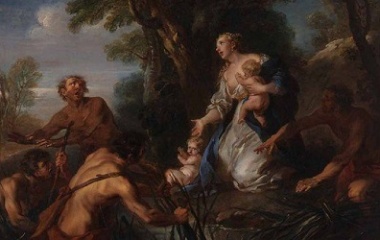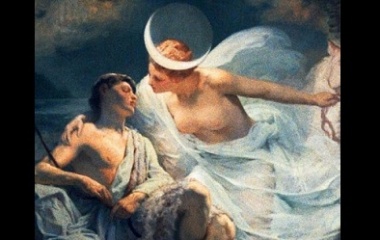Who Is Phoebe?
Phoebe was a Titan goddess with the gift of prophecy. She was one of the 12 descendants of Uranus and Gaea. Like all her sisters, she was never involved in the battle between the Olympian gods and the Titans. She was therefore spared from being captured in Tartarus. Instead, she became a prophet at the Oracle of Delphi.
Origins
Phoebe was a Titan, the name given to individuals of the second generation of divine beings. Phoebe is part of the first generation of Titans, who ruled during the Golden Age. The word “Titan” stands for great size and power, which is an easily recognizable understatement once the stories of the first generation of Titans are told.
The 12 titans include Kronos, Iapetus, Hyperion, Oceanus, Coeus, Creus, Theia, Rhea, Mnemosyne, Phoebe, Tethys and Themis. Phoebe was beautiful, and perhaps one of the calmer Titans. Coeus was the god of intellect and presided over the axis of heaven. Kronos was the King of the Titans and the god of destructive time. He is known for leading the fight with his brothers against Uranus. Although they won, his own son cast him into Tartarus, canceling out the victory.
Phoebe’s sister Rhea was known as the Queen of the Titans and goddess of female fertility. She saved Zeus from Kronos, who would eventually turn on him. Mnemosyne was the goddess of memory, words and language. She was similar to Phoebe in that she was a prophetic goddess, but at the Oracle of Trophonius.
Legends and Stories
Phoebe isn’t one of the most well-known Titans today, but there are still a few myths that involve her.
Oracle of Delphi
The Oracle of Delphi is the most important shrine in all of Greece. It was built around a sacred spring and was considered to be the center of the world.
Phoebe eventually became the third prophet at the Oracle of Delphi. It is said that she heard her mother’s voice while occupying the Oracle. Before her, Gaea and Themis were the prophets. Gaea left the important duty to her daughter, Themis, who eventually passed the duty on to Phoebe, her sister. The work was hard for Phoebe, however, and she thought it to be a very difficult burden. She eventually felt the need to pass on the responsibility and chose her grandson, Apollo, to succeed her. On his birthday, Apollo became the newest prophet and gained a reputation for having a prophetic power greater than the heavens.
Woman in the Moon
The mythology world is a bit split on this bit of history. Some claim that Phoebe was the goddess of the moon, while others say that she is being confused with her grandchildren. If Phoebe was the goddess of the moon, she would have enjoyed some beneficial powers, such as being able to fly, the ability to attract and repel objects, and the ability to conjure a silver light on demand.
Family
Phoebe had two children with her brother Coeus, both daughters. As Phoebe aged, she began to feel attracted to mortal men but she never bore any children from mortals. Versions of events vary; it is also assumed she bore two other children, most likely with her brother, but there is limited information on Perses and Pallas. Instead of being siblings to Asteria and Leto, they might have been cousins instead.
Asteria
Phoebe’s first daughter, named Asteria, was the Titan goddess of prophecies and oracles. She was incredibly beautiful and Zeus tried to seduce her. She had to transform herself into an island to escape his pursuits. The land eventually became known as Delos.
Leto
Leto became the goddess of motherhood and modesty. She was also incredibly beautiful and attracted the attention of Zeus. However, she didn’t reject his advances and eventually became pregnant by him. This made Zeus’ wife Hera incredibly jealous and she followed Leto, preventing her from giving birth on land. Leto eventually sought refuge on Delos and was able to give birth to her twins, Apollo and Artemis.
While Phoebe’s daughters were beautiful and powerful in their own way, her legacy lies within her grandchildren. Greek mythology wouldn’t be nearly as interesting without the stories of Apollo and Artemis.
Apollo
Apollo is one of the easier to recognize names in Greek mythology. He was the son of Zeus and Leto and the god of music. He is often depicted playing a golden lyre. It is also assumed that he was the first to introduce Orpheus to the lyre, which would carve the path for the rest of his life.
Apollo was also an accomplished shooter, and became known as the god of healing when he gave the science of medicine to the mortals. He was also an oracular god, being the prophet at the Oracle in Delphi.
Artemis
Artemis was the twin sister of Apollo, born on the island of Delos. As soon as she was born, she helped her mother give birth to Apollo. She is known as the protector of childbirth and labor. She chose a life of abstinence and never gave into temptation from potential lovers. She instead dedicated her time to hunting and nature. She wasn’t interested in pursuing marriage or falling in love.
Appearance
Artistic representations of Phoebe are all quite similar. Both of her daughters were incredibly beautiful and, based on the depictions of Phoebe, it’s easy to see that they must have inherited her beauty. In fact, Phoebe is known as one of the most beautiful Titans. Phoebe gives off a calming presence, which was surely appreciated by anyone who came to her for advice.
Symbology
Phoebe, though not very well known on her own, is associated with many powerful aspects of Greek mythology. She was the elder goddess of intellect but is mostly known for her prophetic powers at the Oracle of Delphi. Many would argue that her legacy lies in her grandson, Apollo. Phoebe’s symbols include the Oracle of Delphi and the moon, because of her granddaughter Artemis.











i want a burger
thnx for the help on my report.